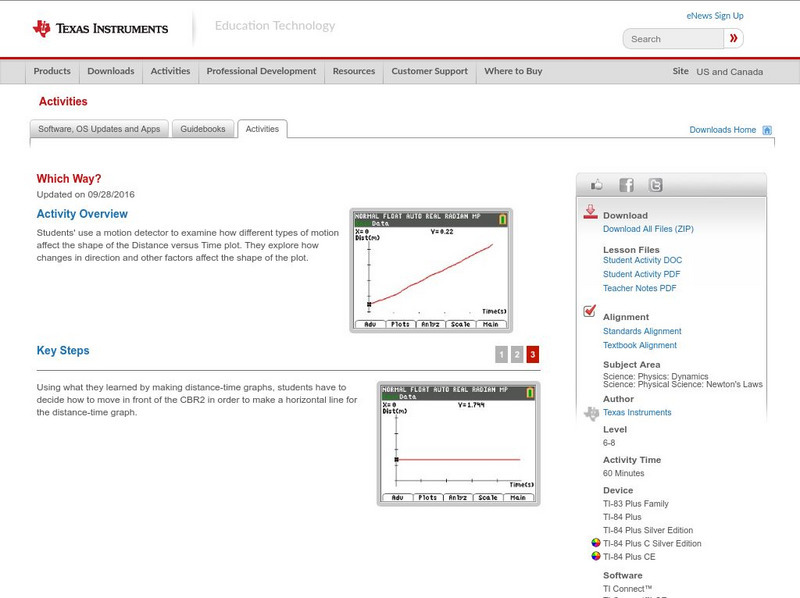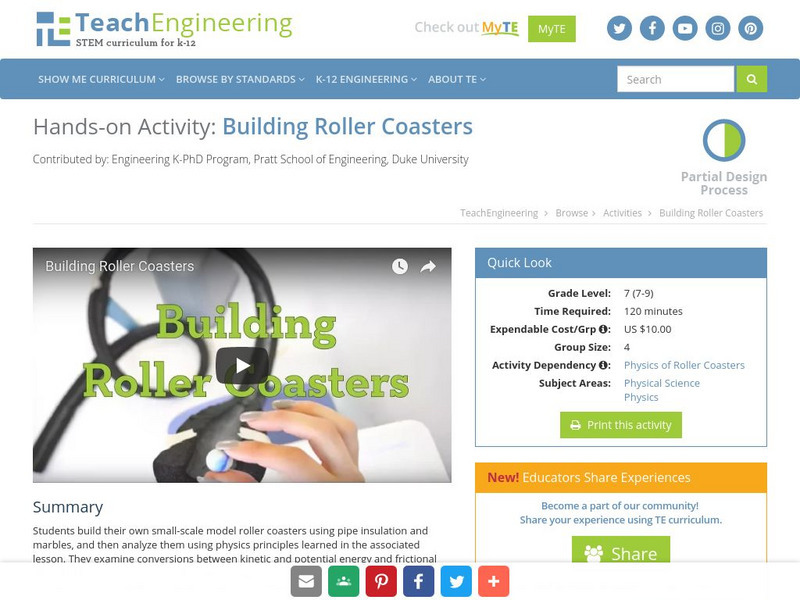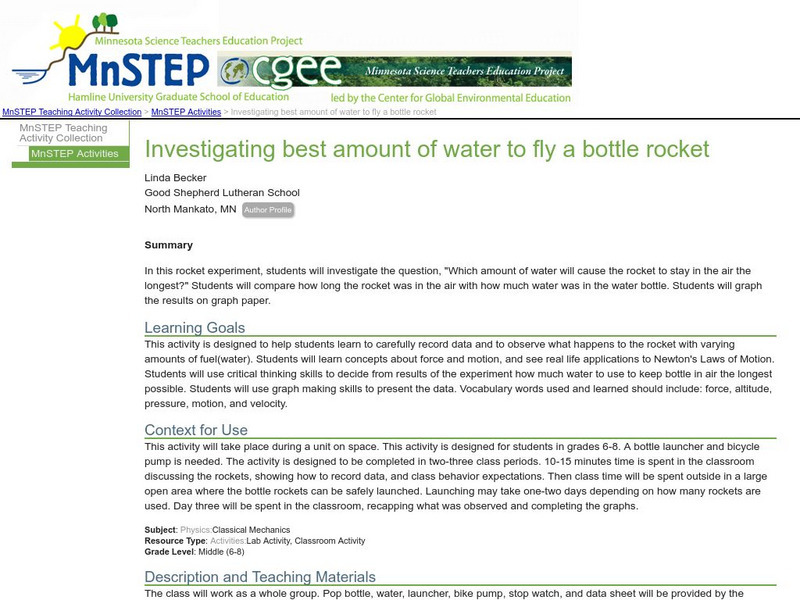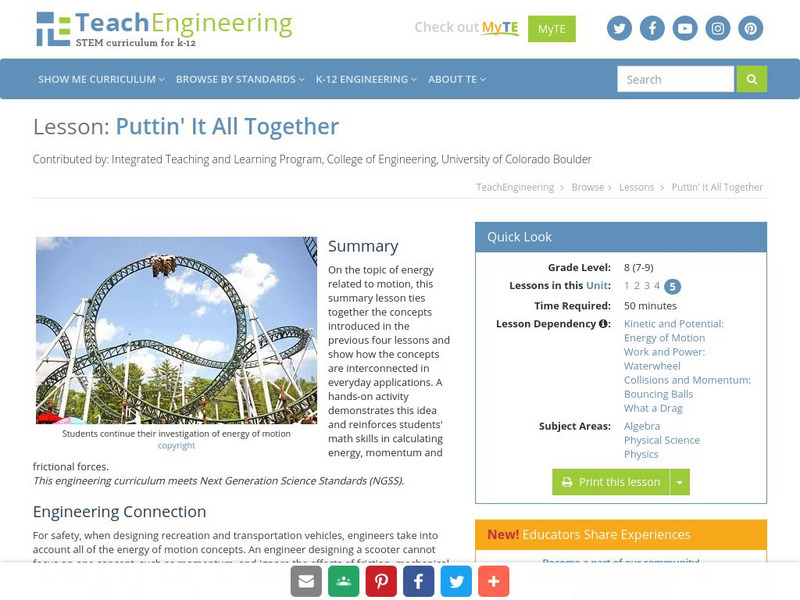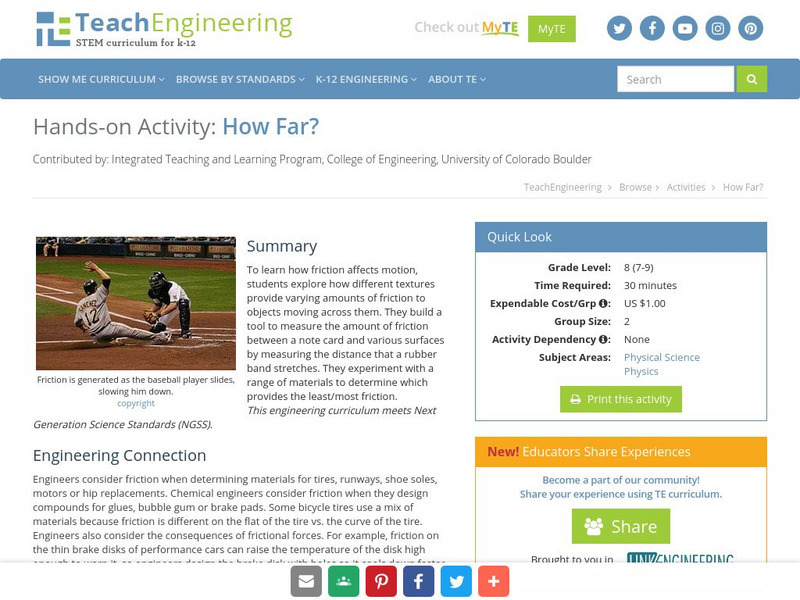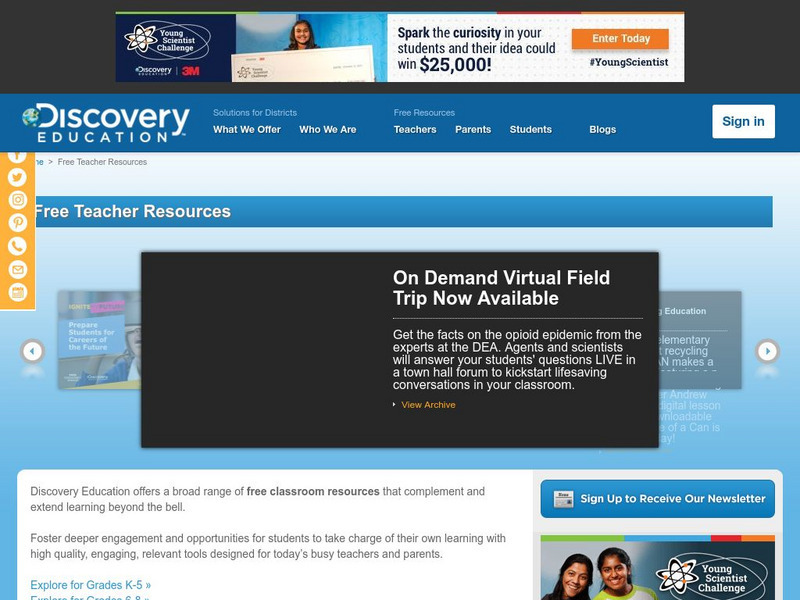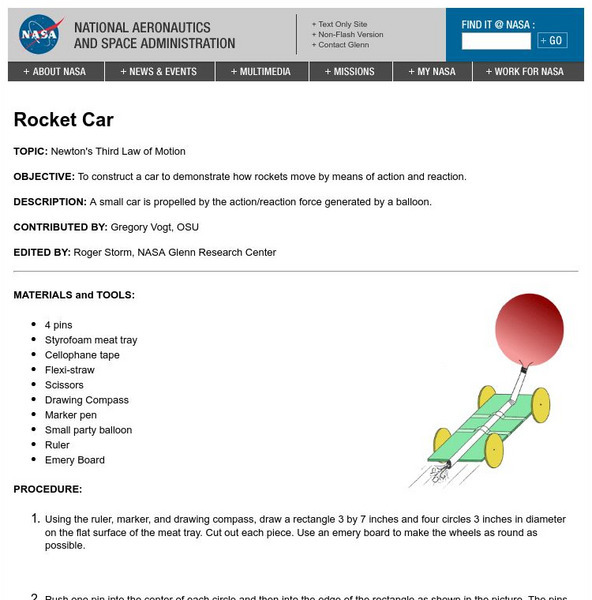Hi, what do you want to do?
Texas Instruments
Texas Instruments: Shape Up!
In this activity, students can use the motion detector to record motion, and observe how the direction of movement, speed of travel, and the rate of change of direction and speed affect the shape of a distance-time plot.
Texas Instruments
Texas Instruments: Which Way?
Students' use a motion detector to examine how different types of motion affect the shape of the distance versus time plot. They explore how changes in direction and other factors affect the shape of the plot.
Science Education Resource Center at Carleton College
Serc: Egg Drop
In this physics lab, students build a container to safely deliver two eggs from the top of the school. Students calculate average velocity, acceleration, momentum, and the amount of force as it hits the ground. If their egg breaks, they...
TeachEngineering
Teach Engineering: Building Roller Coasters
In this hands-on activity students learn about the laws of physics by creating a marble roller coaster.
Center of Science and Industry
Cosi Columbus: Boomerang
Students will make and fly boomerangs and discover that their spinning action is what makes them return to the thrower. Includes full list of materials, procedures, and scientific explanation of "gyroscopic precession".
Science Education Resource Center at Carleton College
Serc: Investigating Best Amount of Water to Fly a Bottle Rocket
In this rocket experiment, young scholars will investigate the question, "Which amount of water will cause the rocket to stay in the air the longest?" Students will compare how long the rocket was in the air with how much water was in...
Texas Instruments
Texas Instruments: The Linear Force Relation for a Rubber Band
In this activity, students' will use a force sensor and a motion detector to study the relationship between the force applied to a rubber band and the distance to which it stretches. They will then model force versus strech data with a...
TeachEngineering
Teach Engineering: Red Light, Green Light
Building upon their understanding of forces and Newton's laws of motion, students learn about the force of friction, specifically with respect to cars. They explore the friction between tires and the road to learn how it affects the...
TeachEngineering
Teach Engineering: Puttin' It All Together
On the topic of energy related to motion, this summary lesson plan is intended to tie together the concepts of work, power, collisions, momentum and drag. A hands-on activity demonstrates this idea and reinforces students' math skills in...
PBS
Pbs Learning Media: The Ruff Ruffman Show: Tower Time
Explore structural science and try to stack a tall, stable tower in this building activity.
TeachEngineering
Teach Engineering: How Far?
To learn how friction affects motion, students explore how different textures provide varying amounts of friction to objects moving across them. They build a tool to measure the amount of friction between a note card and various surfaces...
Discovery Education
Discovery Education: Physical Science: Gravity Gets You Down
For this lesson, students make predictions about falling objects of different sizes and masses to learn about gravity and air resistance. Includes audio vocabulary list and extension activities.
TeachEngineering
Teach Engineering: Sliding Textbooks
In this culminating activity of the unit which highlights how forces play a role in engineering design and material choices, students explore and apply their knowledge of forces, friction, acceleration, and gravity in a two-part experiment.
TeachEngineering
Teach Engineering: Surface Tension
Surface tension accounts for many of the interesting properties we associate with water. By learning about surface tension and adhesive forces, students learn why liquid jets of water break into droplets rather than staying in a...
TeachEngineering
Teach Engineering: Flying With Style
As students begin to understand the physics behind thrust, drag, and gravity and how these relate these to Newton's three laws of motion, groups assemble and launch the rockets that they designed in the associated lesson.
Science Education Resource Center at Carleton College
Serc: Investigating Newton's 3rd Law: Coin Flick
In this elementary physics investigation, students explore Newton's 3rd Law of Motion: To every action there is an equal & opposite reaction. Pairs of students will line up 5 pennies, (touching each other), between 2 rulers. The row...
Other
Federal Aviation Administration: Anti Gravity Marble [Pdf]
This experiment examines Newton's Second Law of Motion. Learn how centrifugal and centripetal force help to keep a marble in a can when turned upside down.
TeachEngineering
Teach Engineering: Action Reaction! Rocket
Students construct a rocket from a balloon propelled along a guide string. They use this model to learn about Newton's three laws of motion, examining the effect of different forces on the motion of the rocket.
TeachEngineering
Teach Engineering: Changing Fields
This lesson begins with an activity in which students induce EMF in a coil of wire using magnetic fields. Then, demonstrations on Eddy currents show how a magnetic field can slow magnets just as Eddy currents are used to slow large...
TryEngineering
Try Engineering: Give Me a Brake
Activity investigates the concept of how bicycle brakes use force and friction to stop or slow mechanical motion. Students work in teams to devise a simple braking system while suggesting improvements to current bicycle brake design.
McREL International
Mc Rel: Whelmer #9 Learning Activity: Nickel Karate
An easy to do activity that investigates the basic theories of inertia. The activity is in lesson plan format that meets NSES standards.
McREL International
Mc Rel: Whelmer #12 Learning Activity: Bernoulli Cans
An easy to do activity that investigates Bernoulli's principle. The activity is presented in lesson plan format that meets NSES standards.
Science and Mathematics Initiative for Learning Enhancement (SMILE)
Smile: Third Law of Motion
This Illinois Institute of Technology site provides a teacher lesson plan for an activity in which students use spring balances and carts to investigate the action-reaction relationship for any given force. Includes directions, materials...
NASA
Nasa Glenn Research Center: Rocket Car (Class Activity)
Students discover Newton's Third Law of Motion by constructing a rocket car.






